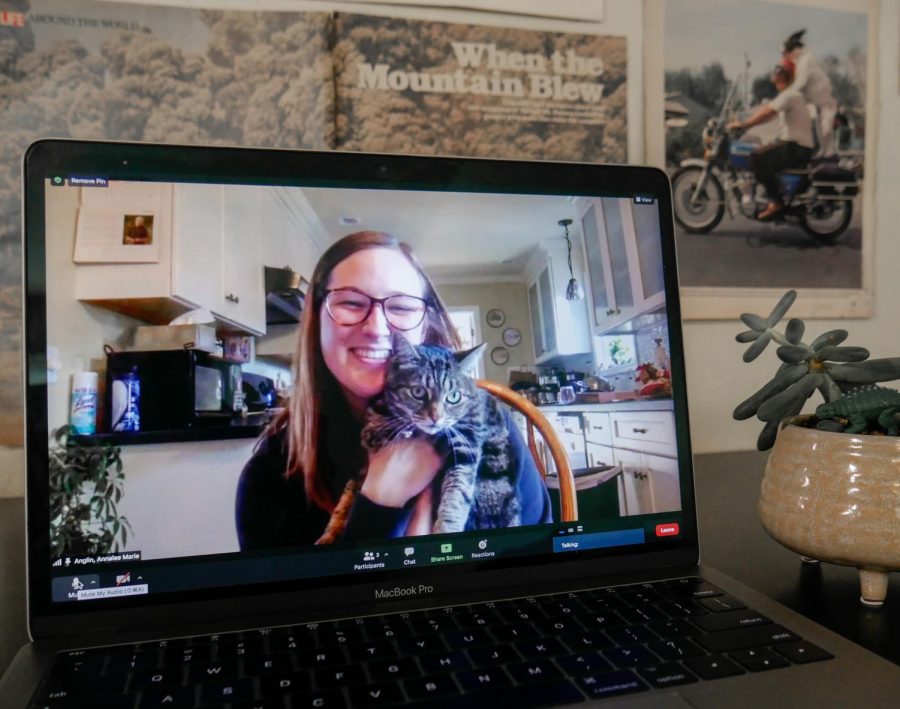Nixon: Pandemic pets have positive mental health effects on college students
January 26, 2021
Editor’s Note: This column does not represent the opinion of The Daily Barometer. This column reflects the personal opinions of the writer.
My partner and I call one of our cats a “pandemic kitty,” because we adopted him a week before COVID-19 began shutting down the country. All Banshee has ever known is a life where we stay home and coddle him (which means he cries at the door every time we leave the house).
Banshee and our other cat, Georgie, may love that we’re always home these days, but I think my partner and I benefit from it more than they do. Maybe it’s the cuddles, the distraction from the chaos of the world, or just because they can be pretty entertaining, but in any case, our pets have somewhat lowered our stress levels.
Scientifically, this checks out. According to HelpGuide, studies show that pet owners are less likely to suffer from depression when compared to those without pets; pet owners have lower blood pressure in times of stress than those without pets; and playing with a dog or cat can even increase serotonin and dopamine levels.
Second-year kinesiology student Annalee Anglin said she felt like having her pets with her has boosted her mood and decreased her stress. Since being home due to COVID-19, Anglin has been spending a lot of time with her three pets: Maltese poodle mix Sally, and cats Pepper and Tamale.
Compared to not having pets while in the dorms, Anglin said she feels like her mental health has been impacted positively by her pets’ presence.
“For me, I just really like that sense of security and knowing that they’re going to be next to me if I want them to be,” Anglin said.
In addition to providing companionship for her, Anglin said having pets around has kept her more active and has even helped her stay on track with homework and studying. Sometimes, she even explains concepts from her classes to her pets to better retain her memory for assignments and exams.
Anglin recommended that college students consider getting a pet if they have the ability to, as they provide an extra source of comfort in times of stress.
“I feel more comforted knowing that they’re there,” Anglin said.
Maddie Johnson, a fourth-year student studying animal science, also said that having a pet while in college has positively affected her mental state. She adopted her Staffordshire-Pitbull mix, Kingston, from a Humane Society in Vancouver, Wash. in 2019.
Johnson described her decision to adopt Kingston as “half impulsive, half not.” At the time, she was undiagnosed and unmedicated for a few mental health issues, and she felt like she needed something to get her out of bed. Adopting Kingston helped her to feel motivated.
“It’s definitely been very helpful. I mean, obviously he’s a dog, he can’t solve everything for me, but it’s at least got me physically going,” Johnson said.
Kingston loves to cuddle – he was actually returned a couple times to the Humane Society Johnson adopted him from for being “aggressively affectionate.” His love and companionship have helped Johnson through college stress as well as stress due to the pandemic.
“[Having a pet] just kind of grounds me,” Johnson said.
Johnson, though having a pet during college has helped her significantly, was cautious about recommending it to everyone.
“I really think it depends on the person…if you’re going to get a pet, I definitely think you have to be in the position to care for one,” Johnson said.
Regardless, Kingston has definitely helped Johnson. She said, “The dog isn’t going to solve it all, but definitely helps.”
As COVID-19 continues to keep us at home, many have wondered how our pets will react when we go back into the world, leaving them behind. But I wonder if humans will feel the effects just as much, or perhaps more, when we can’t spend our work and school days by their sides anymore.

















































































![Newspaper clipping from February 25, 1970 in the Daily Barometer showing an article written by Bob Allen, past Barometer Editor. This article was written to spotlight both the student body’s lack of participation with student government at the time in conjunction with their class representatives response. [It’s important to note ASOSU was not structured identically to today’s standards, likely having a president on behalf of each class work together as one entity as opposed to one president representing all classes.]](https://dailybaro.orangemedianetwork.com/wp-content/uploads/2025/03/Screenshot-2025-03-12-1.00.42-PM-e1741811160853.png)

























